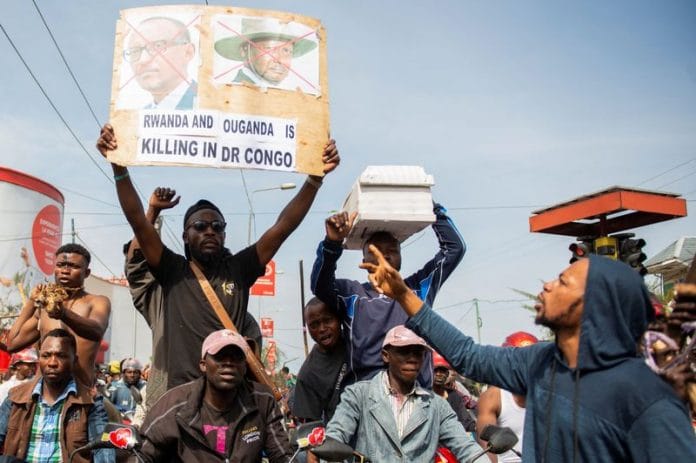GOMA (Reuters) -Democratic Republic of Congo (DRC) has given Rwandan ambassador Vincent Karenga 48 hours to leave the country in retaliation for Rwanda’s alleged support of the M23 rebels in the Congo’s eastern provinces.
The rebel group, which Congolese authorities accuse Rwanda of backing but Rwanda denies, seized the town of Kiwanja in eastern Congo on Saturday, effectively cutting North Kivu’s capital Goma off from the upper half of the province.
“This is, in part, due to the persistence of (Karenga’s) country in attacking DRC and in supporting terrorist movements of the M23,” government spokesman Patrick Muyaya said in a televised statement late on Saturday.
The Rwandan government said it regretted the expulsion of its envoy.
“It is regrettable the Government of the DRC continues to scapegoat Rwanda to cover up and distract from their own governance and security failures,” it said in a statement released overnight.
Three Kiwanja residents told Reuters that droves of fighters had entered the town without significant resistance after a short spat of gunfire on Saturday morning.
A U.N. intervention brigade, which has been supporting government forces, said in a statement that four peacekeepers were wounded in the fighting. The statement did not comment on the fate of the town.
“Attacks against U.N. peacekeepers may constitute war crimes,” it said. “(The mission) calls on this rebel group to immediately cease all belligerence and warns that it stands ready to respond vigorously in the event of further aggression.”
The Congolese army contingent protecting the town had departed the previous day, residents said. The army has conducted strategic retreats from populated areas to move fighting away from towns and protect civilians.
Kivu Security Tracker, which maps unrest in eastern Congo, said the army on Saturday retreated from positions at Rumangabo, their largest camp in the area, and that M23 had surrounded the local U.N. peacekeeper camp and the Virunga National Park.
Saidi Balikwisha Emil, a member of North Kivu’s provincial parliament, said in a WhatsApp message: “The fall of Kiwanja and elsewhere is a national disgrace.”
“Kiwanja (is) an important entity that opens the direct way to Goma,” he added.
Neither General Sylvain Ekenge, the army’s national spokesman, nor Colonel Ndjike Kaiko, the army’s spokesman for North Kivu, responded to requests for comment.
Unrest in North Kivu has broken months of relative calm in eastern Congo after the resumption of clashes between the army and the M23 militants.
Army forces have clashed with rebel fighters several times since fighting resumed on Oct. 20, killing at least four civilians and forcing more than 23,000 people to flee their homes, according to the United Nations. Both groups have accused the other of initiating the violence.
When it formed in 2012, M23 was the newest in a series of ethnic Tutsi-led insurgencies to rise up against Congolese forces.
(Reporting by Djaffar Al Katanty; Additional reporting by Fiston Mahamba and Stanis Bujakera Tshiamala and Elias Biryabarema; Writing by Cooper Inveen and Alessandra Prentice; Editing by Louise Heavens, Alison Williams, Chris Reese and Tomasz Janowski)
Disclaimer: This report is auto generated from the Reuters news service. ThePrint holds no responsibilty for its content.






